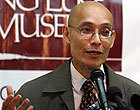Head of Seattle's Wing Luke Asian Museum to retire

Ron Chew, a self-taught curator who turned a rundown museum into a nationally acclaimed institution for Asian history and culture, will retire at the end of the year.
With the Wing Luke Asian Museum scheduled to complete its $23 million capital campaign and relocate into a historic, three-story building in the Chinatown-International District by early next year, executive director Chew said he has achieved all his goals.
"It's time to move on and see what else is on the other side of the museum wall," said Chew, a former journalist who plans to return to writing.
Beth Takekawa, CEO of the museum, will take over as executive director.
It's remarkable that the museum has run so smoothly, considering how much it has grown in 17 years, said Melissa Rosengard, executive director for the Western Museums Association, a professional-development organization in Berkeley, Calif.
"Changes usually create anxiety and you have staff turnovers. But [Chew] is leaving a place that can be inherited without turmoil. That's unusual ... It's a tribute to his leadership."
The 54-year-old Seattle native is beloved in immigrant communities for championing Asian causes.
His exhibits have shed light on Japanese-American internment and brought refugee experiences to the mainstream; journalists often quote him on cultural and racial issues.
But his legacy likely will be his controversial adoption of "community-based exhibits," in which public committees provide ideas and even create exhibitions, instead of relying on a curator's judgment.
For instance, his "Twenty Years after the Fall of Saigon" exhibit included perspectives from local Vietnam veterans and Vietnamese children and artifacts collected from the community.
In recent years, many small museums and historical societies have adopted the community-based model, and Chew often travels around North America to lecture on the topic. "He is a pioneer in the practice of community- based museums," Rosengard said.
The museum was founded in 1965. When Chew took leadership 17 years ago, it was struggling to survive in a converted garage on Seventh Avenue South.
Today it's a financially viable institution with a $1 million annual budget and a prestigious affiliation with the Smithsonian Institution.
Three years ago, the Ford Foundation awarded Chew $115,000 as a "Leadership for a Changing World" winner, which Chew contributed to the museum's capital campaign.
A 1971 Franklin High graduate, Chew studied journalism at the University of Washington. As part of his coursework, he wrote for the I.D.-based newspaper, The International Examiner. But the UW refused to graduate him, saying that the Asian paper did not practice legitimate journalism.
Since then the UW acknowledged that was a mistake and issued him a degree in 2002.
The university inducted him into the Communication Department's Hall of Fame for his work as reporter and editor at the International Examiner from 1975 to 1988.
Over the years, some critics have claimed the Wing Luke lacks focus. Is it a history museum? An art gallery? A cultural center?
Chew said there is nothing wrong with being all of that.
Ellen Ferguson, co-president of the museum board of trustees, considers Chew "visionary" for providing the public with an interactive museum that gives the communities "a voice to tell their immigrant stories."
Takekawa takes over next year as the museum's fourth executive director in its 42-year history.
She plans to add more workshops and exhibits when the museum moves into its expanded 59,000-square-foot facility a few blocks away in May 2008.
To honor Chew, the grand staircase in the new museum will be named after him.
Tan Vinh: 206-515-5656 or tvinh@seattletimes.com